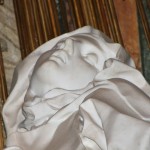I was named to be my Lay Dominican chapter’s formation directory last month, filling out the end of a term for another member, and yesterday I had my first meeting with our two novices. Formation in the Dominican Laity is like this:
- First you come a meeting or two or three, and see whether you want to pursue a Dominican vocation. Assuming you do, you become an “inquirer” (“postulant” is the older term), and at the appropriate time of year (September for our chapter) you begin your first year of formation.
- After a year of meeting with the formation director (or his helper), assuming that you want to continue and the chapter council agrees, you are “received” and become a “candidate” (or “novice”, as I prefer); and you begin your second year of formation, and continue attending formation classes.
- And at the end of your second year, assuming that you want to continue and the council agrees, you make your “first profession,” promising to live as a Lay Dominican for a specific period of time, usually one to three years.
So yesterday I was meeting with our two new novices to begin their second year of formation, and made a promise I might regret, which was to try to do the same homework they do. Each Monday through Friday of the next four weeks, our novices are asked to read two chapters of scripture (starting with Romans and then moving on to 1 Corinthians) and a sequence from the Catechism of the Catholic Church, while also reading over the course of the month a hefty chunk of the Dialogues of St. Catherine of Siena. How I’m going to fit this in with everything else I’m doing I dunno; it will be interesting.
But I did manage to read the first two chapters of Romans this morning, along with the selection from the Catechism. And there are some interesting things in the first two chapters of Romans for budding Dominicans.
Rom 1:15: “I am eager to preach the gospel to you also who are in Rome.” St. Dominic loved St. Paul’s letters. Spoke to his heart, they did.
Rom 1:21: “…they became futile in their thinking and their senseless minds were darkened.” Or, as Mark Shea says, “Sin makes you stupid.” And you wouldn’t want to be stupid.
Rom 1:25: “…they…worshiped and served the creature rather than the Creator.” And that’s what we call idolatry, children, and we all do it sometimes. Every sin involves loving the lesser more than the greater.
Rom 1:32: On doing evil things, “…they not only do them by approve those who practice them.” I’ve often thought that every society has its besetting virtues, which is to say its besetting sins that masquerade as virtues.
Rom 2:14: “When Gentiles who have not the law do by nature what the law requires, they are a law to themselves, even though they do not have the law.” So let’s not cast others aside, just because they don’t agree with us about everything.
And then there’s the biggie, the warning. St. Paul doesn’t talk about millstones, here, but he might as well have:
Rom 2:17-24:
But if you call yourself a Jew and rely upon the law and boast of your relation to God and know his will and approve what is excellent, because you are instructed in the law, and if you are sure that you are a guide to the blind, a light to those who are in darkness, a corrector of the foolish, a teacher of children, having in the law the embodiment of knowledge and truth—you then who teach others, will you not teach yourself? While you preach against stealing, do you steal? You who say that one must not commit adultery, do you commit adultery? You who abhor idols, do you rob temples? You who boast in the law, do you dishonor God by breaking the law? For, as it is written, “The name of God is blasphemed among the Gentiles because of you.”
That’s not a passage for a Dominican to take lightly, nor a teacher of Dominicans.












